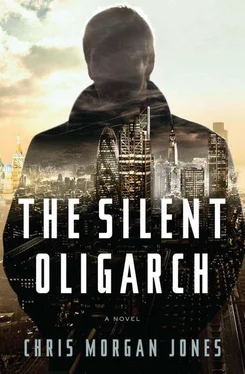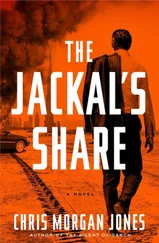ONDER’S OFFICES WERE IN MAYFAIR, in the narrow streets by Shepherd Market. Odd shops inexplicably survived there: Italian outfitters selling pale-blue shoes and mustard leather jackets, to whom Webster couldn’t imagine; tiny beauty salons offering French pedicure and electrolysis; a toy shop that stocked only toy soldiers, each one historically accurate in its uniform. Webster found Onder’s battered red door next to a florist, rang the buzzer, and was let in.
He climbed a flight of stairs and Onder himself came to greet him on the first landing. Hammer had once said of Onder that his size, “in every respect,” was his best quality. He was a tall man, perhaps three inches over six feet, his chest inflated, his hand enclosing Webster’s entirely as they shook. What Hammer had meant, though, was that Onder’s actions and his character were grand: his voice was loud, his generosity instant and complete, his transgressions wholehearted. He was wearing a light gray suit that verged on the silvery and a bright pink tie. Webster was pleased to see him. In his company he remembered vividly what a rare combination Onder was: a trader, a man used to making dozens of subtle calculations every moment, who could nevertheless really think, and plan ahead, and exercise great wisdom when called upon.
“Benedict!” Onder said, with almost actorly diction, smiling broadly. “How nice to see you. Please, please. Come in.” One of the stranger facts about this unusual man was that at sixteen he had moved to England with his family and had spent the last two years of school at Eton. This had given him a certain stateliness that forty years later seemed old-fashioned, even imperial.
He ushered Webster through a faded reception area to his office at the back of the building. They saw no one else on the way. Onder’s office was large, and light enough, but drab. It had too much furniture in it: three wooden-topped desks, their varnish dry and worn; four dull gray filing cabinets; chairs everywhere, some stacked against the wall. Only the phones and the computers suggested that any time had passed since 1970. A bay window, its lower panes frosted, gave out onto a channel of gray house backs.
“I apologize for our surroundings, Benedict. Please, sit down. As you know I don’t go in for fancy offices.”
Webster sat on one of the chairs lined up in front of Onder’s desk, the biggest of the three. “Istanbul is a little smarter than this.”
“True. More by accident than by design.” Onder smiled. “I would offer you coffee but I would have to make it myself and it would be awful. There’s never anyone else here.”
“That’s fine. I’m trying to stop drinking it.”
They sat for a moment looking at each other. Onder’s eyes were a dark, almost Prussian blue. He had a friendly but distinctly firm gaze. Webster wasn’t sure how long he should hold it—was never sure, in fact, what these little sizing-up exercises, so favored by certain clients, really meant. He decided to start.
“Thank you for seeing me at such short notice.”
“Not at all, not at all. I’m always happy to help.” Onder didn’t only trade oil: among other things he also traded cartridges of printer ink, and three years earlier Webster had retrieved a large consignment from a Russian distributor who had forgotten to pay. Onder had liked Ikertu ever since.
“I didn’t want to talk about this on the phone, for reasons you’ll understand, I hope. It’s about Konstantin Malin.”
Onder looked closely at him again, a slight frown in his eyes.
“Malin.” He raised his eyebrows a quarter of an inch. “You deal with some charming people.”
“I know. He’s universally liked. I was hoping you could tell me something about him. Of course, if he’s a partner and you’d rather not we can end it here.”
Onder continued to look at him. Then he laughed and broke the gaze.
“No, Konstantin and I will not be doing business again. There is a kind of Russian who thinks it all right—no, clever —to cheat whenever there is an opportunity. Whenever they can make money. They calculate that there will be another fool along in a minute, and that the world is full of fools. One day they will find out they are wrong.”
“I hope so,” said Webster. “How much does he owe you?”
“Actually, he did not take money from me. He just reneged on an agreement. I have to go elsewhere for oil from Russia now. That is all. It has cost me a lot of money but I cannot say that he stole from me.”
“Is there oil elsewhere?”
“Yes, there is. He doesn’t control everything. Not yet.”
“Did you meet him?”
“Oh yes. Once or twice.” He smiled at Webster. “Perhaps you should tell me why you are interested?”
Webster told Onder the story. When he mentioned Tourna, Onder let out a snort. “That crook! My God, this is fighting among thieves. I thought you would be more choosy about your clients.” He smiled at Webster, who smiled back and carried on. He explained what Tourna wanted, and what his own priority was now: Lock.
“You want to bring down Malin? Good luck. A noble undertaking.”
“I know. We don’t get many shots at nobility.”
Onder smiled. “I know Richard,” he said. “Quite well. I used to deal with Dmitry Gerstman but when he left I refused to have anything to do with the thug they put in his place. I didn’t trust him—one of the new breed, who look a lot like the old, old breed. It was easy to imagine him arresting people at five in the morning. So they sent Lock. I liked him. Not an oil man but useful enough. Quite a simple character. I do not think he really belonged there.”
They talked for a while about Lock and Malin, Malin and Lock, and Webster felt that he was coming to understand them. The moment you met Malin, Onder told him, it was clear that he was “a creature of the Soviet.” He had been born when Stalin was in power, became an adult under Brezhnev, and worked for twenty-five years before Gorbachev departed, his job too well done, and Yeltsin finally appeared. If you were to give him the choice, he would reinstate Communist rule tomorrow, not because he despised capitalism, not because he didn’t enjoy its spoils, but because Communism had made Russia strong and, more important, feared. To sit opposite Malin and negotiate with him was to understand something about a totalitarian state: they shared the same refusal to communicate, and both equated that refusal with strength.
Onder had met Malin three times, it turned out, once socially, and on each occasion had been impressed by his reluctance to engage with the world; the world, it seemed, was obliged to engage with him. He was therefore a difficult man to read—Onder had seldom met anyone so difficult. But from his behavior he had eventually deduced certain things. He was obstinate; he cared little for his reputation in the West, whose opinion was nothing to him; but for all his apparent immobility he made decisions quickly and shrewdly, and was probably a more subtle and delicate thinker than his rather brutish persona would suggest. What drove him, though, was unknowable. “My guess,” said Onder, “is that he does everything for Russia, and for himself. Which is more dear to him I cannot say.”
Lock, meanwhile, was an unlikely associate. Onder thought him competent, but not talented; vain; both flattered and cowed by the company he kept.
“What you must understand,” said Onder, leaning forward and tapping out the important words with a finger on his desk, “is that Malin never expected to be so big. Every Russian is corrupt according to his station in life. If you are a schoolteacher, you sell grades. If you are a fishmonger, you give the best fish to those who can do something for you in return. Malin expected to be a mid-level technocrat taking a few million a year from the odd opportunity here and there. But he has managed to make himself a player and now it’s hundreds of millions, maybe billions. And for this he has Lock.” He gave a short laugh. “Lock is a great man for millions, but for billions he’s out of his depth. But he’s convinced himself somehow he belongs. It’s almost funny. And Malin’s not stupid, not at all—but he can’t change Lock. They cannot rewrite that story. They cannot divorce. It’s worse than a bad marriage.” Onder laughed at his own joke.
Читать дальше












